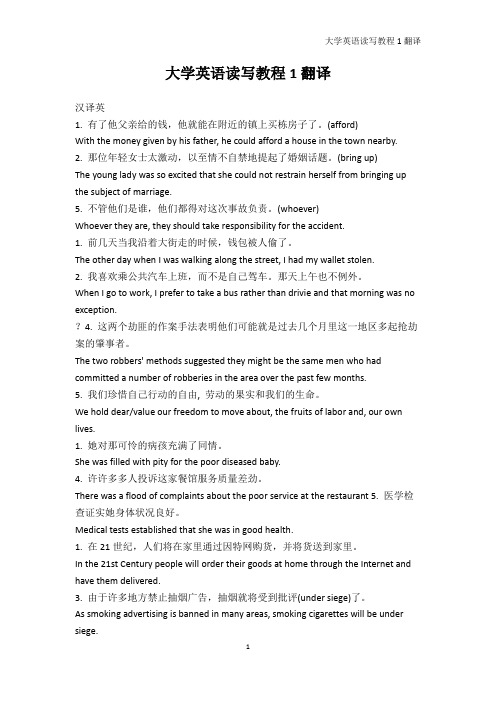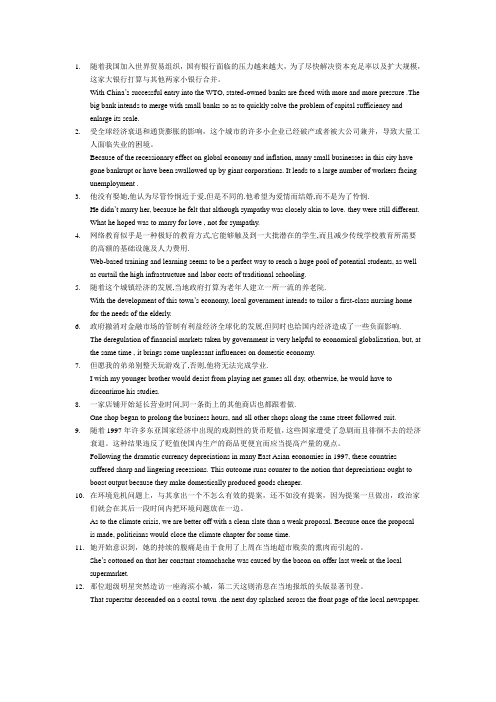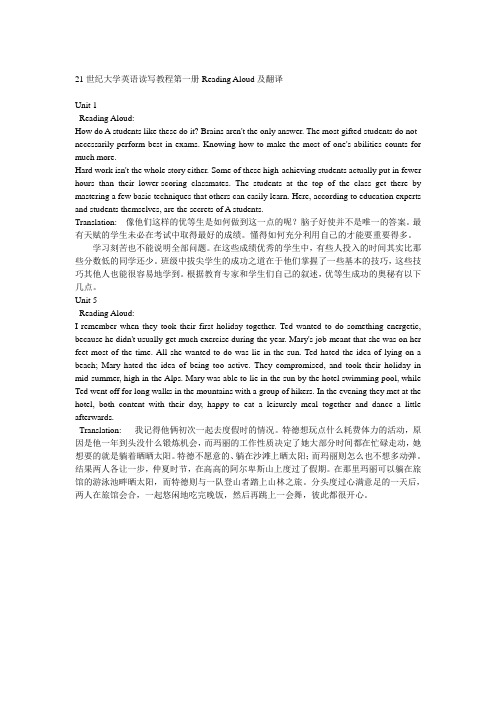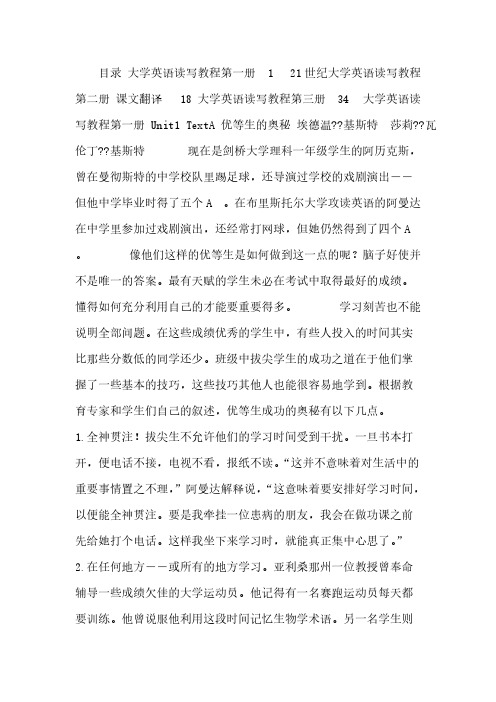21世纪大学英语读写教程第一册课文_翻译
院校资料-大学英语读写教程1翻译

大学英语读写教程1翻译汉译英1. 有了他父亲给的钱,他就能在附近的镇上买栋房子了。
(afford)With the money given by his father, he could afford a house in the town nearby.2. 那位年轻女士太激动,以至情不自禁地提起了婚姻话题。
(bring up)The young lady was so excited that she could not restrain herself from bringing up the subject of marriage.5. 不管他们是谁,他们都得对这次事故负责。
(whoever)Whoever they are, they should take responsibility for the accident.1. 前几天当我沿着大街走的时候,钱包被人偷了。
The other day when I was walking along the street, I had my wallet stolen.2. 我喜欢乘公共汽车上班,而不是自己驾车。
那天上午也不例外。
When I go to work, I prefer to take a bus rather than drivie and that morning was no exception.?4. 这两个劫匪的作案手法表明他们可能就是过去几个月里这一地区多起抢劫案的肇事者。
The two robbers' methods suggested they might be the same men who had committed a number of robberies in the area over the past few months.5. 我们珍惜自己行动的自由, 劳动的果实和我们的生命。
We hold dear/value our freedom to move about, the fruits of labor and, our own lives.1. 她对那可怜的病孩充满了同情。
21世纪大学英语读写教程第一册第3课内容讲解

21世纪大学英语读写教程第一册第3课内容讲解21世纪大学英语读写教程第一册第3课内容讲解导语:史蒂夫莫里斯一出生就是盲目的,可是他并没有自我放弃,而是顽强生存得有声于色,下面是一篇讲述史蒂夫莫里斯的英语课文,欢迎阅读。
Stevie Wonder: Sunshine in the ShadowWhen Stevie Morris was born, on May 13, 1950, the doctors shook their heads and told the mother that her son was born blind and likely would always be that way. She broke into tears.Blind and black and poor — what kind of life could this new infant have? In her wildest dreams, Mrs. Morris could never have imagined that her new baby would become a famous musician called Stevie Wonder. At the time, all she could do was pray —and worry.Stevie himself didn't worry at all. Life was too full. He was brought up among church-going people whose faith helped them bear the poverty. He loved music and would pound spoons or forks on any surface that faintly resembled a drum.He even ran and played with sighted children. "I didn't realize I was blind until I was about four," he says. That might sound strange. To a small child just learning about the world, it wasn't strange at all. Stevie heard and smelled and touched. As far as he knew, that was all anyone could do. That was life.When Stevie's mother got tired of her tables being used for drums, she bought him a toy set. He played so hard that he had actually worn the toy out within a few weeks. Other toy sets followed; then an uncle added a toy harmonica, and Stevie learned to play it so quickly that everyone was amazed.Stevie taught himself to play the piano as quickly as he hadonce learned the harmonica. With friends, he began playing rock and roll music. They performed on the front porch of Stevie's apartment building, drawing crowds of neighbors to watch and listen and clap time to the beat."I loved that beat," Stevie says. He not only loved the beat, he was very good at making it.Ronnie White, of the Miracles singing group, heard Stevie and promptly took him down to his recording company, Motown Records."Give him an audition," Ronnie said. They did. All the top people at Motown got together to hear a little blind boy who wasn't even ten years old yet. At first, they were being nice. Poor kid. They didn't want to hurt his feelings.Then they heard Stevie sing and play, and nobody said "poor kid" anymore. They were too busy congratulating themselves on finding a youngster who could be the musical talent of the decade. "He's a wonder boy," somebody said as they watched little Stevie dart from one instrument to the next, playing each one with ease."Wonder," somebody else said, "Little Stevie Wonder."The new name stuck and Stevie Morris became Little Stevie Wonder. He had his first hit when he was twelve years old. It was called "Fingertips" and it was a smash.Over the following years, Little Stevie Wonder became one of the top recording artists at Motown, producing one hit after another. But as he grew into adulthood, Stevie began to get tired of the way the Motown company controlled all aspects of his career. He wanted to write and produce his own songs, but the Motown company thought it was unwise to change a winning formula.When he turned 21, Stevie finally got his freedom. Against Motown's wishes he started exploring: he made records that combined gospel, rock and roll, and jazz and which used African and Latin American rhythms. To the record company's surprise, Stevie's new albums such as "Music of My Mind" and "Innervisions" were even more popular than his early ones. Stevie Wonder had become a mature man and an independent musical artist.Just after this success, however, tragedy struck. In August of 1973, Stevie was involved in a serious car accident. For nearly a week he lay in a coma, unable to speak or walk. "We don't know when he'll be out of danger," the doctor said. Everyone waited and prayed. Suddenly, it didn't matter that Stevie was a musical genius or that he had conquered blindness and poverty. All he had left was his faith and strong will.That turned out to be enough. Stevie fought back from the shadow of death as he had once fought out from the shadow of blindness. He went on to give more performances, make more hit records.The car accident changed Stevie by making him reevaluate his goals in life. He still loved to make music, but he also started to pay more attention to the world outside. He worked to create a national holiday to honor the civil rights leader Dr.Martin Luther King, Jr.. He recorded songs urging racial harmony and raised money to end world hunger. Recently, Stevie was honored by South African president Nelson Mandela for his work against that country's system of racial apartheid.Stevie Wonder has faith and fame, wealth and love. He has not only conquered his own darkness, but through his music and his social activities he has been able to bring sunshine to theshadow of many other lives.New Wordssunshinen. the light and heat of the sun 阳光infantn. a very young child 婴儿musiciann. a person who performs on a musical instrument, or who writes music 乐师,作曲家prayvi. (for, to) speak to God in order to give thanks or to ask for help 祈祷,祈求spoonn. 匙,调羹faintlhad. slightly; mildly 轻微地;微弱地resemblevt. look or be like 像,类似drumn. 鼓tirev. (使)感到疲劳;(使)厌倦,(使)厌烦harmonican. 口琴amazevt. fill with great surprise; cause wonder in 使惊奇;使惊羡*porchn. (建筑物前有顶的)门廊,入口处apartmentn. 公寓大楼;一套公寓房间vi. applaud 拍手miraclen. 奇迹promptlyad. immediately and without any delay 迅速地,及时地auditionn. (对志愿艺人等的.)面试(指试读、试唱、试奏等)kidn. a child 小孩congratulatevt. speak to (a person) with praise and admiration for a happy event or sth. successfully done 祝贺youngstern. a young person, esp. a boy 年轻人;男孩talentn. 1. a special ability or skill 天才,天资;超常智能2. people of such ability 人才decaden. a period of 10 years 十年(期)*dartvi. move suddenly and quickly 猛冲,飞奔instrumentn. 乐器;仪器;器具;器械easen. 1. freedom from difficulty 容易2. freedom from discomfort, pain or worry 安适;悠闲;无痛苦;无忧虑fingertipn. the end of a finger 指尖n. 轰动的演出,巨大的成功v. (cause to) break into pieces violently 打碎,粉碎adulthoodn. 成年aspectn. a particular part or feature of sth. being considered 方面careern. a profession or occupation with opportunities for advancement or promotion 职业;生涯formulan. 公式,程式;准则,方案explorev. 探索;探测;勘探gospeln. (= gospel music) 福音音乐(美国黑人的一种宗教音乐,具有爵士音乐和美国黑人伤感歌曲色彩)jazzn. 爵士音乐rhythmn. 节奏;韵律*albumn. 1. a long-playing record with several items by the same performer (同一表演者的)集锦密纹唱片2. a book with blank pages for stamps, photographs, etc. 集邮册,相册maturea. fully grown or developed mentally or physically 充分发育的;(智力或体力)成熟的independenta. 独立的,自主的tragedyn. 1. a terrible event that causes great sadness 惨事,灾变2. a serious play with a sad ending 悲剧involvevt. 使陷入,使卷入;牵扯,连累coman. 昏迷musicala. of or for music 音乐的geniusn. 天才;创造能力;天才人物conquervt. gain control over (sth. unfriendly or difficult) 征服;克服(困难等)performancen. the acting of a play, the playing of a piece of music, the doing of a dance, etc., in front of an audience 演出,表演,演奏reevaluatevt. 重新评价goaln. 1. an end; objective 目的;目标2.(足球等的)球门;得分进球hungern. state of not having enough to eat; lack of food 饥饿urgevt. 力劝;恳求;敦促raciala. characteristic of race; due to or resulting from race 种族的;由种族引起的harmonyn. agreement (of feelings, interests, opinions, etc.) 和睦,融洽,一致apartheidn. (南非的)种族隔离famen. the condition of being known or talked about a lot 名声,名望activityn. 活动;行动Phrases and Exgressionsbreak intobegin suddenly (to cry, sing, laugh, etc.) 突然(哭、唱、笑)起来bring uptake care of during infancy and childhood; nurse and educate 抚养;养育as far asto the degree that 就…;尽…;至于get tired ofbe no longer interested in 厌倦,厌烦wear outmake useless by use 把…用坏;把…穿破with easewithout difficulty 容易地,无困难地grow intobecome gradually with the passage of time 成长的congratulate oneself on /that ...因…而暗自庆幸Proper NamesStevie Wonder史蒂威·旺达(人名)Morris莫里斯(姓氏)Ronnie White罗尼·怀特(人名)Motown Records莫顿唱片公司Innervisions《内心幻觉》(唱片名)Martin Luther King, Jr.小马丁·路德·金(1929 — 1968,美国民权运动领袖) Nelson Mandela纳尔逊·曼德拉(1918 —,南非共和国总统)。
21世纪大学英语第一册翻译

1.随着我国加入世界贸易组织,国有银行面临的压力越来越大,为了尽快解决资本充足率以及扩大规模,这家大银行打算与其他两家小银行合并。
With China’s successful entry into the WTO, stated-owned banks are faced with more and more pressure .The big bank intends to merge with small banks so as to quickly solve the problem of capital sufficiency andenlarge its scale.2.受全球经济衰退和通货膨胀的影响,这个城市的许多小企业已经破产或者被大公司兼并,导致大量工人面临失业的困境。
Because of the recessionary effect on global economy and inflation, many small businesses in this city have gone bankrupt or have been swallowed up by giant corporations. It leads to a large number of workers facing unemployment .3.他没有娶她,他认为尽管怜悯近于爱,但是不同的.他希望为爱情而结婚,而不是为了怜悯.He didn’t marry her, because he felt that although sympathy was closely akin to love. they were still different.What he hoped was to marry for love , not for sympathy.4.网络教育似乎是一种极好的教育方式,它能够触及到一大批潜在的学生,而且减少传统学校教育所需要的高额的基础设施及人力费用.Web-based training and learning seems to be a perfect way to reach a huge pool of potential students, as well as curtail the high infrastructure and labor costs of traditional schooling.5.随着这个城镇经济的发展,当地政府打算为老年人建立一所一流的养老院.With the development of this town’s economy, local government intends to tailor a first-class nursing home for the needs of the elderly.6.政府撤消对金融市场的管制有利益经济全球化的发展,但同时也给国内经济造成了一些负面影响.The deregulation of financial markets taken by government is very helpful to economical globalization, but, at the same time , it brings some unpleasant influences on domestic economy.7.但愿我的弟弟别整天玩游戏了,否则,他将无法完成学业.I wish my younger brother would desist from playing net games all day, otherwise, he would have todiscontinue his studies.8.一家店铺开始延长营业时间,同一条街上的其他商店也都跟着做.One shop began to prolong the business hours, and all other shops along the same street followed suit.9.随着1997年许多东亚国家经济中出现的戏剧性的货币贬值,这些国家遭受了急剧而且徘徊不去的经济衰退。
最新21世纪大学英语课文翻译unit1资料

Unit 1 Book 3Do you remember your first love? All those exciting and wonderful new emotions – the way your heart raced when that special person was near –those anxious, awkward moments when you didn't know what to say or do? And then (for most of us) that sad moment when for one reason or another it all came to an end … Ernest Hemingway once said, "Every love story ends as a tragedy" – but the authors of the texts in this unit have a different point of view. Text A focuses on the unexpected side effects of the author's first venture into romance, while Text B recalls the ups and downs of the author's great love for … his car! Finally, the authors of Text C offer some fascinating advice about how to successfully navigate romantic relationships.Text A How I Got SmartA common misconception amongyoungsters attending school is that theirteachers were child prodigies. Who else but abookworm, with none of the normal kid'stendency to play rather than study, wouldgrow up to be a teacher anyway?I've tried desperately to explain to my students that the image they have of me as an enthusiastic devotee of books and homework during my adolescence was a bit out of focus. On the contrary, I hated compulsory education with a passion. I could never quite accept the notion of having to go to school while the fish were biting.But in my sophomore year, something beautiful and exciting happened. Cupid aimed his arrow and struck me right in the heart. All at once, I enjoyed going to school, if only to gaze at the lovely face in English II.My princess sat near the pencil sharpener, and that year I ground up enough pencils to fuel a campfire. Alas, Debbie was far beyond my wildest dreams. We were separated not only by five rows of desks, but by about 50 I.Q. points. She was the top student in English II, the apple of Mrs. Larrivee's eye.Occasionally, Debbie would catch me staring at her, and she would flash a smile that radiated intelligence and quickened my heartbeat. It was a smile that signaled hope and made me temporarily forget the intellectual gulf that separated us.I schemed desperately to bridge that gulf. Andone day, as I was passing the supermarket, an ideacame to me. A sign in the window announced thatthe store was offering the first volume of a set ofencyclopedias at the special price of 29 cents. Theremaining volumes would cost $2.49 each.I purchased Volume I -- Aardvark to Asteroid -- and began my venture into the world of knowledge. I would henceforth become a seeker of facts. I would become Chief Brain in English II and sweepmy princess off her feet with a surge of erudition.I had it all planned.My first opportunity came one day in thecafeteria line. I looked behind me and there shewas.“Hi,” she sai d.After a pause, I wet my lips and said, “Know where anchovies come from?”She seemed surprised. “No, I don't.”I breathed a sigh of relief. “The anchovy lives in salt water and is rarely found in fresh water.” I had to talk fast, so that I co uld get all the facts in before we reached the cash register. “Fishermen catch anchovies in the Mediterranean Sea and along the Atlantic coast near Spain and Portugal.”“How fascinating,” said Debbie, shaking her head in disbelief. It wasobvious that I had made quite an impression.A few days later, during a fire drill, I casuallywent up to her and asked, “Ever been to theAleutian Islands?”“Never have,” she replied.“Might be a nice place to visit, but I certainly wouldn't want to live there,” I said.“Why not?” said Debbie, playing right into my hands.“Well, the climate is forbidding. There are no trees on any of the 100 or more islands in the group. The ground is rocky and very little plant life can grow on it.”“I don't think I'd even care to visit,” she said.The fire drill was over and we began to file into the building, so I had to step it up to get the natives in. “The Aleuts are short and sturdy and have dark skin and black hair. They live on fish, and they trap blue foxes and seals for their valuable fur.”Debbie's eyes widened in amazement.One day I was browsing through the library. Ispotted Debbie sitting at a table, absorbed in acrossword puzzle. She was frowning, apparentlystumped on a word. I leaned over and asked if I couldhelp.“Four-letter word for Oriental female servant,” Debbie said.“Try amah,” I said, quick as a flash.Debbie filled in the blanks, then turned to stare at me in amazement. “I don't believe it,” she said. “I just don't believe it.”And so it went, that glorious, joyous, romantic sophomore year. Debbie seemed to relish our little conversations and hung on my every word.Naturally, the more I read, the more my confidencegrew.In the classroom, too, I was gradually making mypresence felt. One day, during a discussion ofColeridge's “The Ancient Mariner”, we came across theword albatross.“Can anyone tell us what an albatross is?” asked Mrs. Larrivee.My hand shot up. “The albatross is a large bi rd that lives mostly in the ocean regions below the equator, but may be found in the north Pacific as well. The albatross measures as long as four feet and has the greatest wingspread of any bird. It feeds on fish and shellfish. The albatross has an enormo us appetite, and when it's full it has trouble getting into the air again.”There was a long silence in the room. Mrs. Larrivee couldn't quite believe what she had just heard. I sneaked a look at Debbie and gave her a big wink.She beamed proudly and winked back.What I failed to perceive was that Debbie all thiswhile was going steady with a junior from aneighboring school -- a basketball player with a C+average. The revelation hit me hard, and for a while Ifelt like forgetting everything I had learned. I had savedenough money to buy Volume II --Asthma to Bullfinch-- but was strongly tempted to invest in a basketball instead.I felt not only hurt, but betrayed. Like Agamemnon, but with less drasticconsequences, thank God.In time I recovered from my wounds. The next yearDebbie moved from the neighborhood and transferred toanother school. Soon she became no more than a memory.Although the original incentive was gone, I continuedporing over the encyclopedias, as well as an increasing number of other books. Having tasted of the wine of knowledge, I could not now alter my course. For:“A little knowledge is a dangerous thing:Drink deep, or taste not the Pierian spring.”So wrote Alexander Pope, Volume XIV -- Paprika to Pterodactyl.斯蒂夫· 普罗迪上学的孩子们中间有一种普遍的错误想法,即认为他们的老师当年都是些神童。
21世纪大学英语读写译第一次U1~U5译文

Unit 1 Text A College:How to Survive the First Y ear对于许多即将迈入大学校门的学生而言,大学生活似乎令人恐惧。
有些学生对远离家乡感到忧虑不安,有些对高昂的学费一筹莫展,多数则担心自己不能很好地完成学业。
以下十个小忠告不仅能帮助你顺利地度过大学第一年,或任何一年,而且能使你茁壮成长。
第一,参加所有的入学教育的活动。
是的,没错——的确有必要参加所有的入学教育的活动。
你对学校的规章制度越是熟悉,你的表现就会越发出色。
有了对校园生活方方面面的彻底了解——或者至少是那些从活动中所能搜集到的诸多信息的了解,那么,当层出不穷的问题出现时,你便能从容应对。
第二,要有条不紊。
上中学时,老师会引领学生完成作业,告知他们何时该交出作业。
然而,上了大学,教授布置作业,便期望你如期做好准备。
他们没有太多耐心倾听那些“我不知何时该交作业”之类的辩解。
因此,做你该做的——诸如买一个电子记事本,计划制订本,或者一个大大的挂在墙上的日历——无论如何,要做到有条不紊。
第三,有规律地学习。
貌似简单,可是,这是成功必不可少的组成部分。
除了有规律地学习之外,你还应当找一个理想的学习场所,无论是图书馆还是寝室里一个安静的角落,适合即可。
与其他很多事情一样,说到学习时间,质量胜于数量。
第四,准时上课。
迟到,或者不去上课的后果是什么?落后于其他学生,不能完成作业,遗漏课堂笔记,并且常常给教授留下“我不在乎”的印象。
通常,逃掉大清早的课睡个懒觉,或者干脆逃掉所有的课很具诱惑力——务必抵制住这种诱惑。
准时上所有的课,使之成为头等大事。
以后,你的成绩会感激你的所为。
第五,在适当的时候,约见教授。
约见教授不仅是为了问有关作业的问题,而且也是为了了解他们。
记住,与教授保持良好的个人关系益处多多,尤其是当你在学期中遇到一些意想不到的障碍时。
教授安排办公时间,其唯一目的就是与学生会面——利用好那段时间。
第六,结识你的学业顾问。
21世纪大学英语读写教程第一册课后翻译

第一册Unit 11. 汤姆是个非常好奇的男孩,他不仅对“是什么”感兴趣,而且也对“为什么”和“怎么会”感兴趣。
As a very curious boy, Tom is interested not only in whats but also in whys and hows.2. 据史密斯教授说,幸福就是你能充分利用你所有的一切。
Happiness, according to Prof. Smith, is the ability to make the most of what you have.3.你最好把这本书放在你15岁儿子找不到的地方。
You‟d better keep the book where your 15-year-old son can‟t get his hands on it.4. 这故事非常滑稽,比尔一边读一边不停地笑。
The story was so funny that Bill kept laughing all the time while reading it.5. 成绩优秀的学生未必比他们得分较低的同学在学习上花费更多的时间。
High-achieving students do not necessarily put in more time on their studies than their lower-scoring classmates.6. 你是怎样设法说服这些学生修读快速阅读课的?How did you manage to persuade these students to take the speed-reading course?7. 用功是重要的,但知道如何充分利用自己的才能更重要得多。
Working hard is important, but knowing how to make the most of one‟s abilities counts for much more.8. 她要求学生独立思考,而不是告诉他们该思考什么。
大学英语读写教程第一册Reading Alound

21世纪大学英语读写教程第一册Reading Aloud及翻译Unit 1Reading Aloud:How do A students like these do it? Brains aren't the only answer. The most gifted students do not necessarily perform best in exams. Knowing how to make the most of one's abilities counts for much more.Hard work isn't the whole story either. Some of these high-achieving students actually put in fewer hours than their lower-scoring classmates. The students at the top of the class get there by mastering a few basic techniques that others can easily learn. Here, according to education experts and students themselves, are the secrets of A students.Translation: 像他们这样的优等生是如何做到这一点的呢?脑子好使并不是唯一的答案。
最有天赋的学生未必在考试中取得最好的成绩。
懂得如何充分利用自己的才能要重要得多。
学习刻苦也不能说明全部问题。
在这些成绩优秀的学生中,有些人投入的时间其实比那些分数低的同学还少。
班级中拔尖学生的成功之道在于他们掌握了一些基本的技巧,这些技巧其他人也能很容易地学到。
根据教育专家和学生们自己的叙述,优等生成功的奥秘有以下几点。
【VIP专享】新视野大学英语读写教程课文翻译第一册到

目录大学英语读写教程第一册 1 21世纪大学英语读写教程第二册课文翻译18 大学英语读写教程第三册34 大学英语读写教程第一册 Unit1 TextA 优等生的奥秘埃德温??基斯特莎莉??瓦伦丁??基斯特现在是剑桥大学理科一年级学生的阿历克斯,曾在曼彻斯特的中学校队里踢足球,还导演过学校的戏剧演出――但他中学毕业时得了五个A 。
在布里斯托尔大学攻读英语的阿曼达在中学里参加过戏剧演出,还经常打网球,但她仍然得到了四个A。
像他们这样的优等生是如何做到这一点的呢?脑子好使并不是唯一的答案。
最有天赋的学生未必在考试中取得最好的成绩。
懂得如何充分利用自己的才能要重要得多。
学习刻苦也不能说明全部问题。
在这些成绩优秀的学生中,有些人投入的时间其实比那些分数低的同学还少。
班级中拔尖学生的成功之道在于他们掌握了一些基本的技巧,这些技巧其他人也能很容易地学到。
根据教育专家和学生们自己的叙述,优等生成功的奥秘有以下几点。
1.全神贯注!拔尖生不允许他们的学习时间受到干扰。
一旦书本打开,便电话不接,电视不看,报纸不读。
“这并不意味着对生活中的重要事情置之不理,”阿曼达解释说,“这意味着要安排好学习时间,以便能全神贯注。
要是我牵挂一位患病的朋友,我会在做功课之前先给她打个电话。
这样我坐下来学习时,就能真正集中心思了。
”2.在任何地方――或所有的地方学习。
亚利桑那州一位教授曾奉命辅导一些成绩欠佳的大学运动员。
他记得有一名赛跑运动员每天都要训练。
他曾说服他利用这段时间记忆生物学术语。
另一名学生则把词汇表贴在盥洗室墙上,每天刷牙时都记住一个生词。
3.安排好资料。
汤姆在中学时打过篮球。
“我非常忙,不可能为了找一支铅笔或一本不见的笔记本而浪费时间。
我把每样东西都放在随后可取的地方,”他说。
新墨西哥州学生保罗为每门功课备有两个文件夹,一个放当天布置的作业,另一个放已完成要交的家庭作业。
一个抽屉把必需的用品放在一起,这样就可减少因找东西而浪费的时间。
- 1、下载文档前请自行甄别文档内容的完整性,平台不提供额外的编辑、内容补充、找答案等附加服务。
- 2、"仅部分预览"的文档,不可在线预览部分如存在完整性等问题,可反馈申请退款(可完整预览的文档不适用该条件!)。
- 3、如文档侵犯您的权益,请联系客服反馈,我们会尽快为您处理(人工客服工作时间:9:00-18:30)。
Unit1 TextA优等生的奥秘现在是剑桥大学理科一年级学生的阿历克斯,曾在曼彻斯特的中学校队里踢足球,还导演过学校的戏剧演出——但他中学毕业时得了五个A。
在布里斯托尔大学攻读英语的阿曼达在中学里参加过戏剧演出,还经常打网球,但她仍然得到了四个。
Alex, now a first-year student in natural sciences at Cambridge, played football for his school in Manchester and directed the school production of a play —but he left school with five A's. Amanda, studying English at Bristol University, acted in plays at her school and played tennis regularly. Yet she still managed to get four A's.像他们这样的优等生是如何做到这一点的呢?脑子好使并不是唯一的答案。
How do A students like these do it? Brains aren't the only answer.最有天赋的学生未必在考试中取得最好的成绩。
The most gifted students do not necessarily perform best in exams.懂得如何充分利用自己的才能要重要得多。
Knowing how to make the most of one's abilities counts for much more.学习刻苦也不能说明全部问题。
在这些成绩优秀的学生中,有些人投入的时间其实比那些分数低的同学还少。
班级中拔尖学生的成功之道在于他们掌握了一些基本的技巧,这些技巧其他人也能很容易地学到。
根据教育专家和学生们自己的叙述,优等生成功的奥秘有以下几点。
Hard work isn't the whole story either. Some of these high-achieving students actually put in fewer hours than their lower-scoring classmates. The students at the top of the class get there by mastering a few basic techniques that others can easily learn. Here, according to education experts and students themselves, are the secrets of A students.1.全神贯注!拔尖生不允许他们的学习时间受到干扰。
一旦书本打开,便电话不接,电视不看,报纸不读。
“这并不意味着对生活中的重要事情置之不理,”阿曼达解释说,“这意味着要安排好学习时间,以便能全神贯注。
要是我牵挂一位患病的朋友,我会在做功课之前先给她打个电话。
这样我坐下来学习时,就能真正集中心思了。
”Concentrate! Top students allow no interruptions of their study time. Once the books are open, phone calls go unanswered, TV unwatched and newspapers unread. "This doesn't mean ignoring important things in your life," Amanda explains. "It means planning your study time so that you can concentrate. If I'm worried about a sick friend, I call her before I start my homework. Then when I sit down to study, I can really focus."2.在任何地方——或所有的地方学习。
亚利桑那州一位教授曾奉命辅导一些成绩欠佳的大学运动员。
他记得有一名赛跑运动员每天都要训练。
他曾说服他利用这段时间记忆生物学术语。
另一名学生则把词汇表贴在盥洗室墙上,每天刷牙时都记住一个生词。
Study anywhere —or everywhere. A university professor in Arizona assigned to tutor underachieving college athletes, recalls a runner who exercised daily. He persuaded him to use the time to memorise biology terms. Another student stuck a vocabulary list on his bathroom wall and learned a new word every day while brushing his teeth.3.安排好资料。
汤姆在中学时打过篮球。
“我非常忙,不可能为了找一支铅笔或一本不见的笔记本而浪费时间。
我把每样东西都放在随后可取的地方,”他说。
新墨西哥州学生保罗为每门功课备有两个文件夹,一个放当天布置的作业,另一个放已完成要交的家庭作业。
Organize your materials. At school, Tom played basketball. "I was too busy to waste time looking for a pencil or a missing notebook. I kept everything just where I could get my hands on it," he says. Paul, a student in New Mexico, keeps two folders for each subject —one for the day's assignments, the other for homework completed and ready to hand in.一个抽屉把必需的用品放在一起,这样就可减少因找东西而浪费的时间。
A drawer keeps essentials together and cuts down on time-wasting searches.4.安排好时间。
当教师布置写一篇长论文时,阿历克斯会花两三天时间去阅读与题目有关的资料并做笔记,然后写出草稿,再写成论文。
他会计划好在作业该交的前两三天完成,以便如果花费的时间超过预期,他还能在规定的最后期限前完成。
阿曼达严格遵守一张学习时间表,其中包括每两小时休息一次。
“在你过度疲劳时还试图学习并不明智,”她指出,Organize your time. When a teacher set a long essay, Alex would spend a couple of days reading round the subject and making notes, then he'd do a rough draft and write up the essay. He would aim to finish a couple of days before the assignment was due so that if it took longer than expected, he'd still meet the deadline. Amanda stuck to a study schedule that included breaks every two hours. "Trying to study when you're overtired isn't smart," she advises.“短暂的休息,哪怕只是伸展一下身体,呼吸呼吸新鲜空气,也能带来意想不到的效果。
”"Even a short break to stretch or get some fresh air can work wonders."5.学会阅读。
“我过去常花许多时间阅读一些无关的资料,”阿曼达回忆说,“但后来我习惯了快读;如果一段文章的第一句话无关紧要,我便接着读下一段。
”“我修过的最好的一门课便是快速阅读,”一名俄克拉荷马州的学生说,“我不仅提高了每分钟阅读的词数,而且学会了首先看书的目录和插图。
这样,当我开始阅读时,我就对阅读材料先有了一些了解,而且能记住更多的内容。
”Learn how to read. "I used to spend hours going through irrelevant material," Amanda remembers. "But then I got used to reading quickly; if the first sentence of a paragraph wasn't relevant, I'd move on to the next paragraph." "The best course I ever took," says an Oklahoma student, "was speed-reading. I not only increased my words per minute but also learned to look at a book's table of contents and pictures first. Then, when I began to read, I had a sense of the material and I retained a lot more."在这些学生看来,有效阅读的奥秘就在于做一个主动的阅读者,即能不断提出一些能使自己充分理解所读材料的问题。
